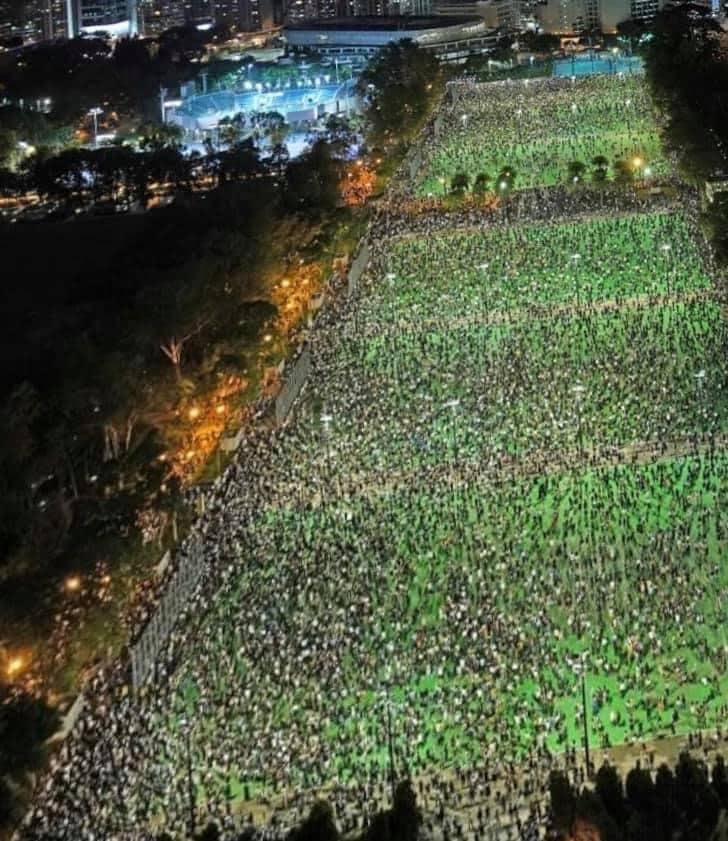
Gianni Criveller
Wonderful people of Hong Kong, as I write these lines on June 4, our Christian brothers and sisters gather in Hong Kong churches to commemorate the students and citizens killed 31 years ago in Tiananmen Square, Beijing.
For the first time in 30 years, the vigil in commemoration of the victims of the 1989 Tiananmen Square crackdown was prohibited, ostensibly on the grounds of group gathering restrictions due to Covid-19 coronavirus (SARS-CoV-2).
The football pitches at Victoria Park, which, in any other year, would be filled to overflowing, were roped off. Nevertheless, people managed to make their way there for a by-and-large peaceful observance. Others lit candles in a gesture of solidarity, while gatherings were held in different locations of the city or online.
In Hong Kong there is anxiety and concern. We are in a suspended time. The future is uncertain. Beijing has fast-tracked a national security bill and many are concerned that it will be the end of Hong Kong as we know it.
Vigils and Masses were also held across the city. Auxiliary Bishop Joseph Ha Chi-shing led one at Holy Cross Church, Shaukiwan.
For 30 years, Hong Kong was the only city in the world where the tragedy of Tiananmen was collectively remembered. Many faithful from Catholic parishes and associations, with their parish priests and missionaries, have always joined it. The largest number of people in attendance was reached in 2009 and last year—the 20th and 30th anniversaries.
Of course, every law counts less than its interpretation and the ways in which it is applied. Yet, the powers-that-be have seemingly turned a deaf ear to the people of Hong Kong; promises made appear to have been broken, and what Hong Kong people already have is under threat.
Perhaps, as some affirm, protesters and pan-democrats also have some responsibility in all this. Perhaps they could accept compromises that had been put on the table in the past.
And the violent path chosen by some demonstrators cannot be excused. I have written many times: violence must always be condemned. It is not justifiable and politically it is counterproductive. Violence only allows opponents of democracy and freedom to justify the suppression of a popular and peaceful movement.

Nevertheless, Hong Kong has proven to be a civil society of the highest quality, pluralistic and free, and stands out in the international context with great dignity. It deserves respect and recognition.
It must be remembered that for decades Hong Kong has seen the most peaceful and educated political demonstrations on the entire planet. Not even a scrap paper was left on the floor. We were there, we saw them with our own eyes. The demands for the introduction of true democracy are in line with the Basic Law, Hong Kong’s mini-constitution, and with the promises and assurances offered to the people of Hong Kong in the years prior to the handover to China in 1997. It is a grave responsibility not to have listened to the peaceful voice of the people.
Hong Kong is Hong Kong. It has its own history and dignity. It is good that the most significant bodies of the international community support the request that comes from an entire cosmopolitan city. I hope that the European Union, the United Nations, the Holy See and the British government will provide their support.
A final consideration concerns the request for help from the president of the United States, Donald Trump. I am disappointed by this. Trump is not a leader worthy of representing a people’s democratic struggle (just consider his responsibility for the American riots these days).
It is not fair to bring the Hong Kong issue into the struggle between China and the United States for world supremacy. Hong Kong can only lose as a pawn in the complicated chessboard of the clash between the two.
Hong Kong is a wonderful and beloved city. Not only does it have beautiful natural landscapes and the world’s most elegant postmodern architecture and skyline. Even more beautiful are the people of Hong Kong, its resilience and dignity. Do not let Hong Kong’s hope die. UCAN
Father Gianni Criveller of the Pontifical Institute for Foreign Missions (PIME) is dean of studies and a teacher at PIME International Missionary School of Theology in Milan, Italy. He taught in Greater China for 27 years and is a lecturer in mission theology and the history of Christianity in China at the Holy Spirit Seminary College of Philosophy and Theology in Hong Kong.
The opinions expressed in this article are those of the author and do not necessarily reflect the official editorial position of UCA News.








